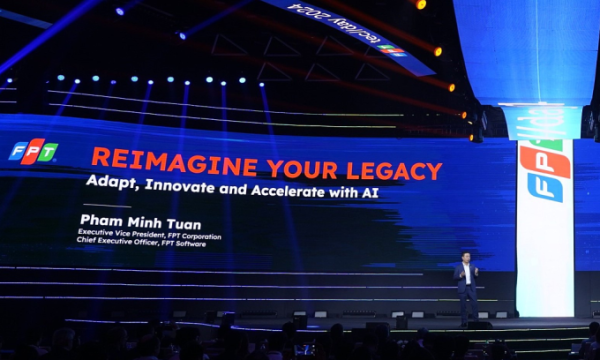
Rise of vertical AI
While the first wave of AI focused on general-purpose models for mass use, the next wave is seeing a shift toward vertical AI – AI tailored for specific sectors and industries such as healthcare, energy, manufacturing, and automotive – which is becoming a significant force in AI commercialization. Experts predict that vertical AI will drive substantial economic value, with AIM Research estimating the global market will exceed $100 billion by 2032.
AI is increasingly tailored to specific industries, from AI-assisted diagnostic systems in healthcare to smart factory operation management and financial assistants in banking. Gartner predicts that by 2026, 80% of enterprises will have adopted domain-specific AI agents.
This shift creates opportunities for businesses with strong technological capabilities, robust computing infrastructure, and deep industry knowledge to develop AI agents – digital colleagues designed to enhance productivity, efficiency, and work quality.
With a comprehensive AI competency—from infrastructure to model development, and hands-on experience solving industry-specific problems both domestically and internationally, FPT is positioning itself ahead of this trend, offering practical, value-driven approaches that solve major challenges for clients worldwide.
Capturing the vertical AI opportunity
In Japan, a highly developed market under pressure from legacy systems, many businesses still rely on decades-old software platforms. These outdated systems, with millions of lines of antiquated code, incur high operating costs, low efficiency, and difficulties in integrating modern technologies. For example, a major real estate company in Japan once required months to process internal data due to its fragmented and automation-resistant system.
FPT has partnered with enterprises in Japan and other countries in their digital modernization journeys, leveraging AI models to interpret and analyze legacy code and automate data processing workflows. Using xMainframe, a proprietary FPT technology, the company has reduced project timelines by 30% while helping engineers quickly grasp old systems with up to 90% accuracy. As a result, clients can now update data weekly instead of monthly, significantly improving operational efficiency.
|
Pham Minh Tuan, Executive Vice President of FPT Corporation and CEO of FPT Software, speaks at FPT Techday 2024 event. Photo courtesy of FPT |
This is just one example of how FPT is using AI to address practical, industry-specific challenges. “We’re focusing on developing specialized AI for specific verticals – deep niches that remain largely untapped, where AI can truly create real, differentiated value,” said Pham Minh Tuan, Executive Vice President of FPT Corporation and CEO of FPT Software.
In the manufacturing sector, for example, FPT has developed the I2 platform, enabling businesses to monitor quality, predict maintenance, and optimize operational performance through the analysis of image and sound data from production lines.
In finance and insurance, the IvyChat solution applies large language models (LLMs) to automate data analysis, support sales performance evaluation, and enhance data management.
In healthcare, FPT’s CareMate solution, particularly its iTelemate feature, enables doctors to quickly understand patient conditions via summarized medical histories and real-time multilingual transcription, enhancing consultation quality and personalized communication.
These solutions not only showcase technological strength but also reflect a deep understanding of each market’s unique needs, delivering practical value to enterprises.
A key factor in FPT’s leadership in domain-specific AI is its internal organizational transformation. The company is reshaping its workforce to combine human expertise with AI, creating an AI-augmented workforce where each employee is supported by a personal AI assistant. This assistant helps optimize daily work, from execution to creativity, and ensures global integration.
According to Tuan, while AI still struggle with user empathy, cultural sensitivity, and experience design, it can serve as a platform for training, supporting, and developing a new generation of human resources with enhanced speed and productivity. This is how humans and technology can evolve together, not as competitors, but as collaborators, driving improvements in work quality and life.
As the global landscape shifts toward domain-specific AI, FPT is solidifying its role as a pioneer, not only through technological capabilities but also through a commitment to organizational and human transformation. This adaptability will be key in building a sustainable competitive advantage and propelling FPT forward in the AI era.